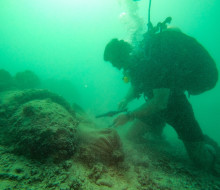
Second World War-era bombs in Vanuatu made safe by Navy divers
26 June 2024
Unfortunately you are viewing this website on an outdated browser which does not support the necessary features for us to provide an adequate experience. Please switch to a modern browser such as latest version of Google Chrome, Mozilla Firefox, Apple Safari or Microsoft Edge.
Ngā mihi nui
Warrant Officer Class 1 (WO1) Carlo De Negri will “close a little family loop” at this year’s Anzac Day commemorations on the Gallipoli Peninsula.
The Tūrangi-born career soldier will be able to pay his respects to his great-grand uncle Teira Meti Kingi, who died at Chunuk Bair in 1915.
Another great-grand uncle, Henare Mete Kingi, was killed during the Battle of the Somme, and WO1 De Negri was able to pay his respects to him when he attended the centenary commemorations for that battle in 2016.
WO1 De Negri’s great-grandfather Nga Paki Mete Kingi served at Gallipoli and survived to return to New Zealand.
“My great-grandfather named his two daughters after the areas where his brothers passed away – Fleur is my great-aunt and my nanna is Dardenella, named after the Dardenelles.”
He didn’t think they ever visited the places they were named after.
“This is definitely a pilgrimage for myself. It’s good to close the loop after getting to travel to the Somme.
“Being able to serve in the same location as they did, as a soldier, it will be a humbling and emotional experience.”
WO1 De Negri was born in Tūrangi, lived in Italy for six years and came back to Whanganui for his schooling.
He joined the New Zealand Army in 2000 as a gunner with the Royal Regiment of New Zealand Artillery and during his career has deployed to East Timor, Afghanistan and Iraq.
He has spent the majority of his career based at Linton Military Camp near Palmerston North, where he is now a career manager.
Most of the 40-strong NZDF contingent arrived in Türkiye about a week before the 25 April anniversary to acclimatise and rehearse before the ceremonies.
Battlefield tours were part of the programme so the members could learn more about their predecessors and the battles that were fiercely fought at Gallipoli.
“Recognising the significance of this event is crucial as it embodies our collective history. If we neglect it, we risk losing the memory of the sacrifices made by those soldiers.
“Without honouring their legacy, their efforts and sacrifices may fade into obscurity, diminishing their profound impact on our lives.”